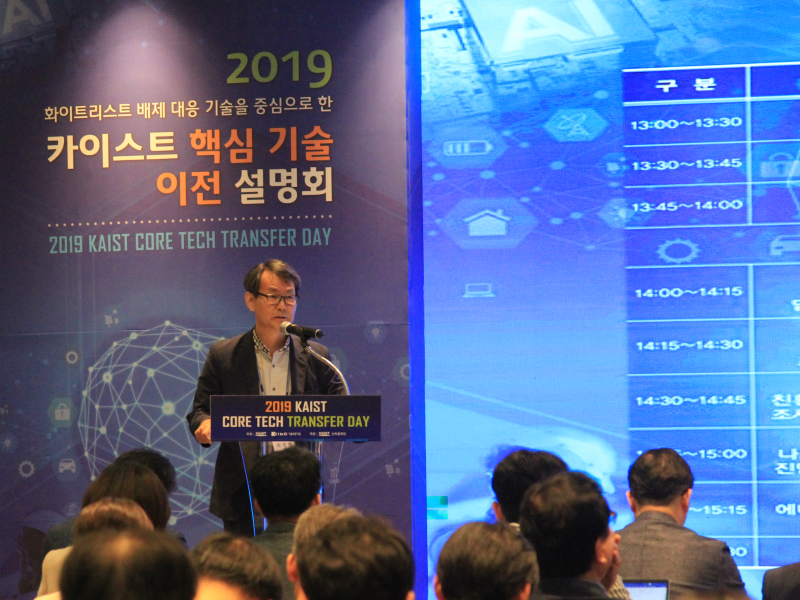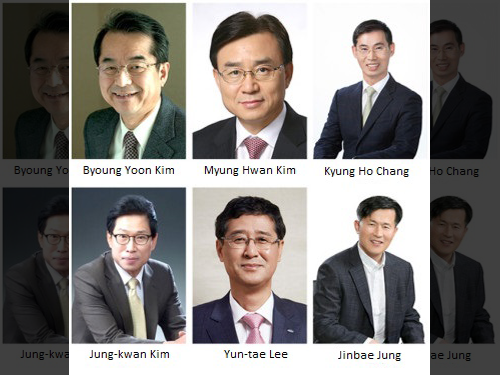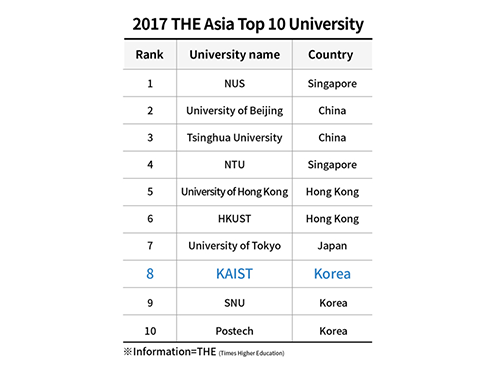industry
-
 KAIST to Transfer Core Tech to Domestic Companies amid Japan's Export Curbs
< Associate Vice President Kyung-Cheol Choi of the Office of University-Industry Cooperation (OUIC) at KAIST >
KAIST will transfer four core technologies related to materials, parts, and equipment to domestic companies to help them combat the latest export curbs triggered by Korea’s removal from Japan’s ‘white list’ of preferential trade partners. In addition, KAIST’s five patented technologies in the field of artificial intelligence (AI) and materials and parts will also be transferred to the companies in order to reduce the reliance on Japan and achieve technological independence through the ‘localization’ of key technologies.
KAIST announced these university-industry cooperation promotion plans at the ‘2019 KAIST Core Tech Transfer Day Conference’ held in Seoul on September 17. More than 200 entrepreneurs and investors attended the briefing and on-site consulting sessions delivered by nine KAIST professors who led the development of the technologies.
The four technologies were presented at the conference as those that can replace Japanese technologies subject to the export curbs. They include:
1. ‘Transparent fluorinated polyimide with low thermal expansion’ developed by Professor Sang-Youl Kim of the Department of Chemistry
2. ‘A non-destructive electromagnetic performance testing system’ developed by Professor Jung-Ryul Lee of the Department of Aerospace Engineering
3. ‘A nanotechnology-based electrode material for use in advanced secondary batteries’ developed by Professor Do-Kyung Kim of the Department of Materials Science and Engineering
4. ‘A high-resolution photoresist’ developed by Professor Emeritus Jin-Baek Kim of the Department of Chemistry.
Of particular interest is the non-destructive electromagnetic performance testing system technology developed by Professor Jung-Ryul Lee. This new cost-effective technology enables tests that were impossible to carry out using conventional technologies and yields a cost reduction of more than 50 percent compared to foreign technologies.
By introducing Professor Do-Kyung Kim’s new electrode material technology, the efficiency of electric vehicles can be increased. As this technology uses relatively low-cost sodium ion batteries, industries can prepare for the possible jump from the more expensive lithium batteries currently being used.
Another five patented AI and materials and parts technologies disclosed at the conference include:
1. ‘Enhanced HTTP adaptive streaming with CNN-based super-resolution’ developed by Professor Dong-soo Han of the School of Electrical Engineering
2. ‘Method and apparatus of brain-computer interface design for estimating choice behavior and decision strategy’ developed by Professor Sang-Wan Lee of the Department of Bio and Brain Engineering
3. ‘Eco-friendly fabrication of metal oxide nanoparticles and fabrication of non-toxic polymer sunscreen ingredients by electron irradiation’ developed by Professor Sung-Oh Cho of the Department of Nuclear and Quantum Engineering
4. ‘High-density nanofiber yarn-based coloricmetric gas sensors’ developed by Professor Il-Doo Kim of the Department of Materials Science and Engineering
5. ‘Silicon-pocket energy storage electrode with high energy density and its manufacturing technology’ developed by Professor Jeung-Ku Kang of the Graduate school of EEWS.
The patented nanofiber-based coloricmetric gas sensor technology developed by Professor Il-Doo Kim allows for the diagnosis of diseases by only using the patient’s respiration. Due to its high productivity and processability, it is expected to be applied to various fields in the fast-growing disease diagnosis sensor market, which includes mobile devices and wearable sensors.
Moreover, Professor Dong-soo Han’s patented adaptive streaming technology attracted attention along with the ever-growing Over The Top (OTT) and Video On Demand (VOD) service markets, since it has significant potential for improving the streaming quality of videos and reducing costs for video providers.
Professor Kyung-Cheol Choi, the Associate Vice President of the Office of University-Industry Cooperation (OUIC) at KAIST, said, “KAIST OUIC and KAIST Advisors on Materials and Parts (KAMP) have been working tirelessly to help Korean companies cope with the recent Japanese export restrictions. KAIST’s efforts will enhance the competitiveness and growth of the Korean industry and economy, turning this national crisis into opportunity.”
(END)
2019.09.20 View 7859
KAIST to Transfer Core Tech to Domestic Companies amid Japan's Export Curbs
< Associate Vice President Kyung-Cheol Choi of the Office of University-Industry Cooperation (OUIC) at KAIST >
KAIST will transfer four core technologies related to materials, parts, and equipment to domestic companies to help them combat the latest export curbs triggered by Korea’s removal from Japan’s ‘white list’ of preferential trade partners. In addition, KAIST’s five patented technologies in the field of artificial intelligence (AI) and materials and parts will also be transferred to the companies in order to reduce the reliance on Japan and achieve technological independence through the ‘localization’ of key technologies.
KAIST announced these university-industry cooperation promotion plans at the ‘2019 KAIST Core Tech Transfer Day Conference’ held in Seoul on September 17. More than 200 entrepreneurs and investors attended the briefing and on-site consulting sessions delivered by nine KAIST professors who led the development of the technologies.
The four technologies were presented at the conference as those that can replace Japanese technologies subject to the export curbs. They include:
1. ‘Transparent fluorinated polyimide with low thermal expansion’ developed by Professor Sang-Youl Kim of the Department of Chemistry
2. ‘A non-destructive electromagnetic performance testing system’ developed by Professor Jung-Ryul Lee of the Department of Aerospace Engineering
3. ‘A nanotechnology-based electrode material for use in advanced secondary batteries’ developed by Professor Do-Kyung Kim of the Department of Materials Science and Engineering
4. ‘A high-resolution photoresist’ developed by Professor Emeritus Jin-Baek Kim of the Department of Chemistry.
Of particular interest is the non-destructive electromagnetic performance testing system technology developed by Professor Jung-Ryul Lee. This new cost-effective technology enables tests that were impossible to carry out using conventional technologies and yields a cost reduction of more than 50 percent compared to foreign technologies.
By introducing Professor Do-Kyung Kim’s new electrode material technology, the efficiency of electric vehicles can be increased. As this technology uses relatively low-cost sodium ion batteries, industries can prepare for the possible jump from the more expensive lithium batteries currently being used.
Another five patented AI and materials and parts technologies disclosed at the conference include:
1. ‘Enhanced HTTP adaptive streaming with CNN-based super-resolution’ developed by Professor Dong-soo Han of the School of Electrical Engineering
2. ‘Method and apparatus of brain-computer interface design for estimating choice behavior and decision strategy’ developed by Professor Sang-Wan Lee of the Department of Bio and Brain Engineering
3. ‘Eco-friendly fabrication of metal oxide nanoparticles and fabrication of non-toxic polymer sunscreen ingredients by electron irradiation’ developed by Professor Sung-Oh Cho of the Department of Nuclear and Quantum Engineering
4. ‘High-density nanofiber yarn-based coloricmetric gas sensors’ developed by Professor Il-Doo Kim of the Department of Materials Science and Engineering
5. ‘Silicon-pocket energy storage electrode with high energy density and its manufacturing technology’ developed by Professor Jeung-Ku Kang of the Graduate school of EEWS.
The patented nanofiber-based coloricmetric gas sensor technology developed by Professor Il-Doo Kim allows for the diagnosis of diseases by only using the patient’s respiration. Due to its high productivity and processability, it is expected to be applied to various fields in the fast-growing disease diagnosis sensor market, which includes mobile devices and wearable sensors.
Moreover, Professor Dong-soo Han’s patented adaptive streaming technology attracted attention along with the ever-growing Over The Top (OTT) and Video On Demand (VOD) service markets, since it has significant potential for improving the streaming quality of videos and reducing costs for video providers.
Professor Kyung-Cheol Choi, the Associate Vice President of the Office of University-Industry Cooperation (OUIC) at KAIST, said, “KAIST OUIC and KAIST Advisors on Materials and Parts (KAMP) have been working tirelessly to help Korean companies cope with the recent Japanese export restrictions. KAIST’s efforts will enhance the competitiveness and growth of the Korean industry and economy, turning this national crisis into opportunity.”
(END)
2019.09.20 View 7859 -
 Distinguished Alumni Awards 2017 by KAIST Alumni Association
The KAIST Alumni Association announced six Distinguished Alumni Awardees for the year 2017.
Every year, the association selects alumni who have brought honor and distinction to the university through significant contributions to industry, academic achievements, or community service. Since 1992, a total of 95 alumni have been chosen for the distinguished alumni awards.
The recipients are playing major roles in society, and this year is no exception. The award will be given to the alumni during the KAIST New Year Ceremony on January 13 in Seoul.
Here are the six distinguished alumni of the year 2017.
The Director of Startup KAIST, Byoung Yoon Kim (M.S. in Physics) is one of the faculty who has brought entrepreneurship to KAIST. Before founding companies, he held the position of assistant professor at Stanford University. In 1995, he founded FiberProf Inc, commercializing research results from KAIST lab for their applications to test and measurement equipment for lab and production lines. He launched Novera Optics, Inc in 1999 which produced broadband access network equipment (WDM-PON) for FTFH application. Since 2014, he has been holding the position of director of KAIST Startup and inspiring entrepreneurship. He is being recognized for playing a crucial role in defining a successful model for technology startup ecosystems.
The President of LG Chem Ltd., and Head of Battery Research and Development, Myung Hwan Kim (M.S. in Chemical and Biomolecular Engineering) succeeded in developing and producing the first lithium ion batteries in Korea. His work contributed to Korea becoming the second most powerful nation in batteries. In particular, he obtained more orders from global automobile companies by successfully commercializing batteries for electronic vehicles, which led elevating national competitiveness. Recently, his company is leading the battery market for automobiles and power storage by developing novel materials and supplying optimal batteries to match each field.
The Director of INNOX Advanced Materials Co., Ltd., Kyung Ho Chang (M.S. in Chemistry and Ph.D. in Materials Science and Engineering) challenged himself in the Flexible Printed Circuit Board (FPCB) industry, which was mostly dominated by Japanese companies in 2001; however, he succeeded in localizing the materials. Now, his company is the number one for FPCB materials in Korea. FPCBs are a component used in most electronic devices, including smartphones and tablet PCs. Localizing the materials has brought about an import substitution effect as well as establishing a foundation for national competitiveness in FPCBs.
The Vice President of the Korea International Trade Association (KITA), Jung-kwan Kim (M.S. in Business) began his career from deputy director in Ministry of Trade, Industry and Energy. Throughout his career at MOTIE, he served as Director for Energy Development, Director General for Energy Industry Policy, Head Officer of Energy and Resources, and finally Vice Minister for MOTIE. Since joining KITA as the vice president in 2015, he has contributed to supporting overseas expansion of new industries and reinforcing trade competitiveness through opening new markets and providing customized consulting.
The CEO of Samsung Electro-Mechanics, Yun-tae Lee (M.S. and Ph.D. in Electrical Engineering) is an expert in designing semiconductors. While serving as Head of System LSI and Head of LCD in Samsung Electronics, he made significant contributions to projects involving semiconductors and displays, which are the company’s engine of growth. Moreover, by utilizing his insights from the component business and making bold decisions, he is leading the future of Samsung Electro-Mechanics.
The CEO of ENF Technology, Jinbae Jung (Ph.D. in Chemical and Biomolecular Engineering) reinforced national industrial competitiveness by developing high-performance chemicals that are used mostly in the production of semiconductors and displays. Especially, he succeeded in applying regeneration technology of thinners and developing various stripping liquidsHe also localized color pastes, which were heavily dependent on Japan, and improved the quality of color accuracy for LCD panels.
Notable Recipient of Distinguished Alumni Award
2018.01.05 View 9055
Distinguished Alumni Awards 2017 by KAIST Alumni Association
The KAIST Alumni Association announced six Distinguished Alumni Awardees for the year 2017.
Every year, the association selects alumni who have brought honor and distinction to the university through significant contributions to industry, academic achievements, or community service. Since 1992, a total of 95 alumni have been chosen for the distinguished alumni awards.
The recipients are playing major roles in society, and this year is no exception. The award will be given to the alumni during the KAIST New Year Ceremony on January 13 in Seoul.
Here are the six distinguished alumni of the year 2017.
The Director of Startup KAIST, Byoung Yoon Kim (M.S. in Physics) is one of the faculty who has brought entrepreneurship to KAIST. Before founding companies, he held the position of assistant professor at Stanford University. In 1995, he founded FiberProf Inc, commercializing research results from KAIST lab for their applications to test and measurement equipment for lab and production lines. He launched Novera Optics, Inc in 1999 which produced broadband access network equipment (WDM-PON) for FTFH application. Since 2014, he has been holding the position of director of KAIST Startup and inspiring entrepreneurship. He is being recognized for playing a crucial role in defining a successful model for technology startup ecosystems.
The President of LG Chem Ltd., and Head of Battery Research and Development, Myung Hwan Kim (M.S. in Chemical and Biomolecular Engineering) succeeded in developing and producing the first lithium ion batteries in Korea. His work contributed to Korea becoming the second most powerful nation in batteries. In particular, he obtained more orders from global automobile companies by successfully commercializing batteries for electronic vehicles, which led elevating national competitiveness. Recently, his company is leading the battery market for automobiles and power storage by developing novel materials and supplying optimal batteries to match each field.
The Director of INNOX Advanced Materials Co., Ltd., Kyung Ho Chang (M.S. in Chemistry and Ph.D. in Materials Science and Engineering) challenged himself in the Flexible Printed Circuit Board (FPCB) industry, which was mostly dominated by Japanese companies in 2001; however, he succeeded in localizing the materials. Now, his company is the number one for FPCB materials in Korea. FPCBs are a component used in most electronic devices, including smartphones and tablet PCs. Localizing the materials has brought about an import substitution effect as well as establishing a foundation for national competitiveness in FPCBs.
The Vice President of the Korea International Trade Association (KITA), Jung-kwan Kim (M.S. in Business) began his career from deputy director in Ministry of Trade, Industry and Energy. Throughout his career at MOTIE, he served as Director for Energy Development, Director General for Energy Industry Policy, Head Officer of Energy and Resources, and finally Vice Minister for MOTIE. Since joining KITA as the vice president in 2015, he has contributed to supporting overseas expansion of new industries and reinforcing trade competitiveness through opening new markets and providing customized consulting.
The CEO of Samsung Electro-Mechanics, Yun-tae Lee (M.S. and Ph.D. in Electrical Engineering) is an expert in designing semiconductors. While serving as Head of System LSI and Head of LCD in Samsung Electronics, he made significant contributions to projects involving semiconductors and displays, which are the company’s engine of growth. Moreover, by utilizing his insights from the component business and making bold decisions, he is leading the future of Samsung Electro-Mechanics.
The CEO of ENF Technology, Jinbae Jung (Ph.D. in Chemical and Biomolecular Engineering) reinforced national industrial competitiveness by developing high-performance chemicals that are used mostly in the production of semiconductors and displays. Especially, he succeeded in applying regeneration technology of thinners and developing various stripping liquidsHe also localized color pastes, which were heavily dependent on Japan, and improved the quality of color accuracy for LCD panels.
Notable Recipient of Distinguished Alumni Award
2018.01.05 View 9055 -
 KAIST Ranked Top in Korea, 8th in Asia in 2017 THE Asia Rankings
KAIST ranked top among Korean universities and 8th in Asia according to the 2017 THE (Times Higher Education) Asia University Rankings published on March 16. This is the first time that KAIST took the top position in Korea in the THE rankings.
The 2017 THE Asia University Rankings rank the top 300 universities in Asia, employing five performance indicators: teaching, research, citations, industry income, and international outlook.
KAIST jumped two spots from last year to rank first in Korea with outstanding improvements in teaching and research this year, while earning the perfect score for industry income for the second consecutive year.
2017.03.17 View 4098
KAIST Ranked Top in Korea, 8th in Asia in 2017 THE Asia Rankings
KAIST ranked top among Korean universities and 8th in Asia according to the 2017 THE (Times Higher Education) Asia University Rankings published on March 16. This is the first time that KAIST took the top position in Korea in the THE rankings.
The 2017 THE Asia University Rankings rank the top 300 universities in Asia, employing five performance indicators: teaching, research, citations, industry income, and international outlook.
KAIST jumped two spots from last year to rank first in Korea with outstanding improvements in teaching and research this year, while earning the perfect score for industry income for the second consecutive year.
2017.03.17 View 4098